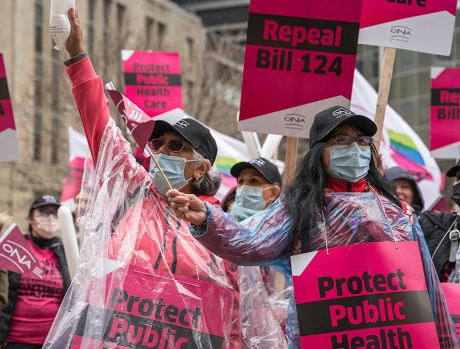Fight Ford!
You are here
Patients, unions unite to fight Ford

October 6, 2022
The Ontario Health Coalition (OHC) held a dynamic organizing conference over two days at the start of October. It brought together hundreds of activists from across the province, in person and on zoom, representing grassroots groups and unions. A large number of local organizations have developed in the last years in many towns and cities under the umbrella of the OHC. It has brought together both residents and health care workers committed to fighting the attacks on our public health care system.
There was a real sense of the urgency from those participating both from urban and rural areas. They felt that their work against the privatizing of health care has led to a 5% drop in popularity for Premier Doug Ford since the provincial election. The Conservative government had passed legislation forcing seniors out of hospitals into long term care (LTC) facilities far from their homes unless they are prepared to pay $400 daily. They have no choice. The OHC activists are committed to continue the fight against this callous disregard of people’s needs.
The key issues people across the country are concerned about are the cost of living and health care. The reasons are obvious. There has been a concerted drive by governments for decades to assist for-profit corporations in taking a larger and larger portion of the sector. The government has created a crisis and put this forward as the only solution. There is a huge need for more spaces to relieve the pressure on hospitals and families.
The province of Ontario is providing money for 30,000 badly needed new and rebuilt LTC beds, but the vast majority are going to for-profit companies. They have the worst record of resident deaths, neglect and inadequate care during the pandemic, but it doesn’t matter to these free market ideologues. There were demonstrations in front of many of these institutions, rallies at the provincial legislature, summits across the province, meetings in community centres and union halls, and yet nothing was done and now these same corporations are being rewarded. There is an ideological assault on public services and the OHC has taken a strong stand against it, mobilizing communities to raise their voices and fight back.
It has strong support from hospital unions, and private sector unions are supporting the organizing as well. There were contingents from many of them at the conference lending their weight to the campaign.
The fight against the rising cost of living is also continuing. The Canadian Union of Public Employees (CUPE) just had a 96.5% strike vote among support staff at Ontario schools.
Negotiations are continuing. The average wage is $39,000 and they are demanding wage increases that deal with the inflationary spiral we are experiencing. They have proposed an increase of $3.25 an hour for every worker. We saw the successful strikes fought by many unions in the building trades a few months ago which shut down work sites across the province.
There has been a lot of pressure on the trade union leadership to launch a broad-based campaign as we have seen in other countries. “Enough is Enough” in the UK has combined mass mobilizations against the rising cost of living with strong strike support for workers walking out for wage increases and broader improvements in their working conditions. There is a mood to fight both in the community and the workplace. We have seen it on the picket line and in groups such as the OHC. Let’s continue to organize locally, build mass demonstrations and support striking workers to push back the attacks.
Section:









